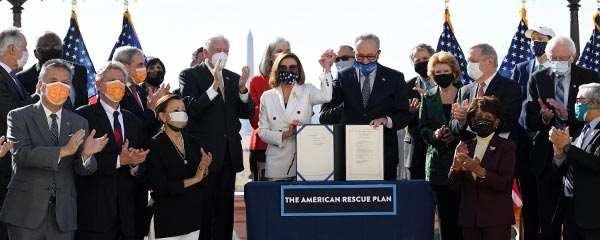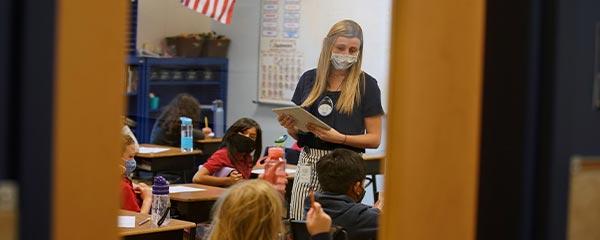Story Highlights
- Satisfaction with vaccination process up 24 points to 68%
- 74% of U.S. adults willing to receive vaccine or are already vaccinated
- Democrats, older adults, college graduates most willing to be vaccinated
WASHINGTON, D.C. -- With well over 100 million COVID-19 vaccine doses administered, the public's satisfaction with the rollout has surged 24 percentage points to 68% in the last month.
Satisfaction with the COVID-19 vaccine process has doubled since January and is now at the majority-level among all major demographic subgroups. It is particularly high among adults aged 65 and older (77%), a group that has been prioritized for vaccines, those who have received at least one vaccine dose (75%) and Democrats (73%), whose satisfaction has more than tripled since President Joe Biden took office.
| Jan. 2021 | Feb. 2021 | Mar. 2021 | ||||||||||||||||||||||||||||||||||||||||||||||||||||||||||||||||||||||||||||||||||||||||||||||||||
|---|---|---|---|---|---|---|---|---|---|---|---|---|---|---|---|---|---|---|---|---|---|---|---|---|---|---|---|---|---|---|---|---|---|---|---|---|---|---|---|---|---|---|---|---|---|---|---|---|---|---|---|---|---|---|---|---|---|---|---|---|---|---|---|---|---|---|---|---|---|---|---|---|---|---|---|---|---|---|---|---|---|---|---|---|---|---|---|---|---|---|---|---|---|---|---|---|---|---|---|---|
| % | % | % | ||||||||||||||||||||||||||||||||||||||||||||||||||||||||||||||||||||||||||||||||||||||||||||||||||
| U.S. adults | 34 | 44 | 68 | |||||||||||||||||||||||||||||||||||||||||||||||||||||||||||||||||||||||||||||||||||||||||||||||||
| Party identification | ||||||||||||||||||||||||||||||||||||||||||||||||||||||||||||||||||||||||||||||||||||||||||||||||||||
| Republicans | 49 | 47 | 66 | |||||||||||||||||||||||||||||||||||||||||||||||||||||||||||||||||||||||||||||||||||||||||||||||||
| Independents | 37 | 42 | 63 | |||||||||||||||||||||||||||||||||||||||||||||||||||||||||||||||||||||||||||||||||||||||||||||||||
| Democrats | 22 | 44 | 73 | |||||||||||||||||||||||||||||||||||||||||||||||||||||||||||||||||||||||||||||||||||||||||||||||||
| Age | ||||||||||||||||||||||||||||||||||||||||||||||||||||||||||||||||||||||||||||||||||||||||||||||||||||
| 18-44 | 30 | 43 | 63 | |||||||||||||||||||||||||||||||||||||||||||||||||||||||||||||||||||||||||||||||||||||||||||||||||
| 45-64 | 39 | 46 | 69 | |||||||||||||||||||||||||||||||||||||||||||||||||||||||||||||||||||||||||||||||||||||||||||||||||
| 65+ | 34 | 46 | 77 | |||||||||||||||||||||||||||||||||||||||||||||||||||||||||||||||||||||||||||||||||||||||||||||||||
| Vaccination status | ||||||||||||||||||||||||||||||||||||||||||||||||||||||||||||||||||||||||||||||||||||||||||||||||||||
| Fully/Partially vaccinated | 40 | 53 | 75 | |||||||||||||||||||||||||||||||||||||||||||||||||||||||||||||||||||||||||||||||||||||||||||||||||
| Plan to be vaccinated | 27 | 42 | 69 | |||||||||||||||||||||||||||||||||||||||||||||||||||||||||||||||||||||||||||||||||||||||||||||||||
| Do not plan to be vaccinated | 46 | 44 | 57 | |||||||||||||||||||||||||||||||||||||||||||||||||||||||||||||||||||||||||||||||||||||||||||||||||
| GALLUP PANEL | ||||||||||||||||||||||||||||||||||||||||||||||||||||||||||||||||||||||||||||||||||||||||||||||||||||
Although the transition from a Donald Trump to a Biden presidency has resulted in partisans' views on many issues flipping, this has not been the case when it comes to satisfaction with the vaccination process. Republicans' satisfaction, which was higher than Democrats' in January just after Trump left office, has increased 17 points to 66% since then.
║┌┴¤═°'s latest COVID-19 probability-based web panel survey was conducted Mar. 15-21, more than two weeks after the Food and Drug Administration (FDA) granted emergency-use authorization for the Johnson & Johnson single-dose vaccine. Now that three FDA-approved vaccines are available, supply has increased across the country, which has likely contributed to the increase in satisfaction with the rollout.
Slight Uptick in Americans' Willingness to Receive Vaccine
With more than a million Americans receiving COVID-19 vaccines every day, the public's overall willingness to be inoculated against the disease has edged up three points. This continues the upward trajectory to a new high of 74% since hitting a low of 50% in September.

Line graph. Americans' willingness to receive a COVID-19 vaccination that has been approved by the FDA since July. Currently, 74% say they are willing to receive one, and 26% say they will not. This includes 32% who have already received at least one dose of the vaccine. The previous high was 71% in January and February, and the low was a 50% reading in September.
Since January, ║┌┴¤═° has tracked the percentages of Americans who have already been partially or fully vaccinated and included them with those who express willingness to receive one. The latest data include 19% who are fully vaccinated, 13% partially vaccinated, and 42% who plan to get vaccinated but have not yet done so. The 26% who say they would not agree to be vaccinated is the lowest by three points since July.
Although at least slim majorities of Americans in all major demographic subgroups say they are willing to receive a COVID-19 vaccine or have already done so, there continue to be significant differences among some of these groups. Older Americans, Democrats, college graduates and those with incomes of $90,000 or above are more likely than their counterparts to say they have already received a vaccine or want to do so.
| Have already received vaccine |
Combined: Willing to receive/ Already received |
|||||||||||||||||||||||||||||||||||||||||||||||||||||||||||||||||||||||||||||||||||||||||||||||||||
|---|---|---|---|---|---|---|---|---|---|---|---|---|---|---|---|---|---|---|---|---|---|---|---|---|---|---|---|---|---|---|---|---|---|---|---|---|---|---|---|---|---|---|---|---|---|---|---|---|---|---|---|---|---|---|---|---|---|---|---|---|---|---|---|---|---|---|---|---|---|---|---|---|---|---|---|---|---|---|---|---|---|---|---|---|---|---|---|---|---|---|---|---|---|---|---|---|---|---|---|---|
| % | % | |||||||||||||||||||||||||||||||||||||||||||||||||||||||||||||||||||||||||||||||||||||||||||||||||||
| U.S. adults | 32 | 74 | ||||||||||||||||||||||||||||||||||||||||||||||||||||||||||||||||||||||||||||||||||||||||||||||||||
| Gender | ||||||||||||||||||||||||||||||||||||||||||||||||||||||||||||||||||||||||||||||||||||||||||||||||||||
| Men | 31 | 75 | ||||||||||||||||||||||||||||||||||||||||||||||||||||||||||||||||||||||||||||||||||||||||||||||||||
| Women | 33 | 74 | ||||||||||||||||||||||||||||||||||||||||||||||||||||||||||||||||||||||||||||||||||||||||||||||||||
| Age | ||||||||||||||||||||||||||||||||||||||||||||||||||||||||||||||||||||||||||||||||||||||||||||||||||||
| 18-44 | 24 | 75 | ||||||||||||||||||||||||||||||||||||||||||||||||||||||||||||||||||||||||||||||||||||||||||||||||||
| 45-64 | 26 | 68 | ||||||||||||||||||||||||||||||||||||||||||||||||||||||||||||||||||||||||||||||||||||||||||||||||||
| 65+ | 61 | 84 | ||||||||||||||||||||||||||||||||||||||||||||||||||||||||||||||||||||||||||||||||||||||||||||||||||
| Party identification | ||||||||||||||||||||||||||||||||||||||||||||||||||||||||||||||||||||||||||||||||||||||||||||||||||||
| Republicans | 27 | 54 | ||||||||||||||||||||||||||||||||||||||||||||||||||||||||||||||||||||||||||||||||||||||||||||||||||
| Independents | 27 | 67 | ||||||||||||||||||||||||||||||||||||||||||||||||||||||||||||||||||||||||||||||||||||||||||||||||||
| Democrats | 40 | 94 | ||||||||||||||||||||||||||||||||||||||||||||||||||||||||||||||||||||||||||||||||||||||||||||||||||
| Education | ||||||||||||||||||||||||||||||||||||||||||||||||||||||||||||||||||||||||||||||||||||||||||||||||||||
| Not college graduate | 29 | 69 | ||||||||||||||||||||||||||||||||||||||||||||||||||||||||||||||||||||||||||||||||||||||||||||||||||
| College graduate | 39 | 87 | ||||||||||||||||||||||||||||||||||||||||||||||||||||||||||||||||||||||||||||||||||||||||||||||||||
| Annual household income | ||||||||||||||||||||||||||||||||||||||||||||||||||||||||||||||||||||||||||||||||||||||||||||||||||||
| <$36,000 | 24 | 71 | ||||||||||||||||||||||||||||||||||||||||||||||||||||||||||||||||||||||||||||||||||||||||||||||||||
| $36,000-<$90,000 | 32 | 72 | ||||||||||||||||||||||||||||||||||||||||||||||||||||||||||||||||||||||||||||||||||||||||||||||||||
| $90,000+ | 36 | 80 | ||||||||||||||||||||||||||||||||||||||||||||||||||||||||||||||||||||||||||||||||||||||||||||||||||
| ║┌┴¤═° Panel, Mar. 15-21, 2021 | ||||||||||||||||||||||||||||||||||||||||||||||||||||||||||||||||||||||||||||||||||||||||||||||||||||
Reasons for Reluctance About Receiving COVID-19 Vaccine
Asked for the main reason behind their reluctance to be immunized, those who are unwilling to receive a COVID-19 vaccine are most likely to say they say they want to wait and confirm it is safe (23%) or do not think the health effects from the disease would be serious if they contracted it (20%). Additionally, 16% are concerned about the speed with which the vaccine was developed, 15% do not trust vaccines in general, 10% say they already have COVID-19 antibodies due to having the disease, 9% are concerned about having an allergic reaction to the shot and 7% prefer to wait and see how effective it is in preventing the disease.
| Those who would not be vaccinated |
|||||||||||||||||||||||||||||||||||||||||||||||||||||||||||||||||||||||||||||||||||||||||||||||||||
|---|---|---|---|---|---|---|---|---|---|---|---|---|---|---|---|---|---|---|---|---|---|---|---|---|---|---|---|---|---|---|---|---|---|---|---|---|---|---|---|---|---|---|---|---|---|---|---|---|---|---|---|---|---|---|---|---|---|---|---|---|---|---|---|---|---|---|---|---|---|---|---|---|---|---|---|---|---|---|---|---|---|---|---|---|---|---|---|---|---|---|---|---|---|---|---|---|---|---|---|
| % | |||||||||||||||||||||||||||||||||||||||||||||||||||||||||||||||||||||||||||||||||||||||||||||||||||
| Want to wait to confirm it is safe | 23 | ||||||||||||||||||||||||||||||||||||||||||||||||||||||||||||||||||||||||||||||||||||||||||||||||||
| Don't think health effects of COVID-19 would be serious | 20 | ||||||||||||||||||||||||||||||||||||||||||||||||||||||||||||||||||||||||||||||||||||||||||||||||||
| Concerned about timeline for developing it | 16 | ||||||||||||||||||||||||||||||||||||||||||||||||||||||||||||||||||||||||||||||||||||||||||||||||||
| Don't trust vaccines generally | 15 | ||||||||||||||||||||||||||||||||||||||||||||||||||||||||||||||||||||||||||||||||||||||||||||||||||
| Had the coronavirus/have antibodies | 10 | ||||||||||||||||||||||||||||||||||||||||||||||||||||||||||||||||||||||||||||||||||||||||||||||||||
| Concerned about allergic reaction to the vaccine | 9 | ||||||||||||||||||||||||||||||||||||||||||||||||||||||||||||||||||||||||||||||||||||||||||||||||||
| Want to wait to see how effective it is | 7 | ||||||||||||||||||||||||||||||||||||||||||||||||||||||||||||||||||||||||||||||||||||||||||||||||||
| ║┌┴¤═° Panel, mar. 15-21, 2021 | |||||||||||||||||||||||||||||||||||||||||||||||||||||||||||||||||||||||||||||||||||||||||||||||||||
Americans' Mask Use Before and After Vaccination
Guidance from the Centers for Disease Control and Prevention (CDC) for those who have been fully vaccinated is to continue to wear a mask when in public. However, the CDC has said that fully vaccinated people can gather indoors with other fully vaccinated people without wearing a mask or with unvaccinated people from one other household if no one in that household is at increased risk for severe illness from COVID-19.
As was true in January and February, it appears that Americans are following this guidance in public. Those who have already been at least partially immunized against COVID-19 (96%) are just as likely as those who have not but plan to be (96%) to say they have worn a mask outside their home in the past seven days. However, those who are not willing to be vaccinated continue to be significantly less likely to report wearing a mask (72%).
At a time when many Americans have been vaccinated, but even more are waiting to be, ║┌┴¤═° asked the public how their mask usage might change when around people they know have been vaccinated, people they know have not been vaccinated, and people whose vaccination status they aren't sure of.
As might be expected, Americans are much more inclined to say they would "always" wear a mask around people they know have not been vaccinated (59%) or whom they aren't sure about (65%) than someone they know has been vaccinated (31%).
| U.S. adults | |||||||||||||||||||||||||||||||||||||||||||||||||||||||||||||||||||||||||||||||||||||||||||||||||||
|---|---|---|---|---|---|---|---|---|---|---|---|---|---|---|---|---|---|---|---|---|---|---|---|---|---|---|---|---|---|---|---|---|---|---|---|---|---|---|---|---|---|---|---|---|---|---|---|---|---|---|---|---|---|---|---|---|---|---|---|---|---|---|---|---|---|---|---|---|---|---|---|---|---|---|---|---|---|---|---|---|---|---|---|---|---|---|---|---|---|---|---|---|---|---|---|---|---|---|---|
| % | |||||||||||||||||||||||||||||||||||||||||||||||||||||||||||||||||||||||||||||||||||||||||||||||||||
| You know IS vaccinated | 31 | ||||||||||||||||||||||||||||||||||||||||||||||||||||||||||||||||||||||||||||||||||||||||||||||||||
| You know IS NOT vaccinated | 59 | ||||||||||||||||||||||||||||||||||||||||||||||||||||||||||||||||||||||||||||||||||||||||||||||||||
| You DON'T KNOW if they are vaccinated | 65 | ||||||||||||||||||||||||||||||||||||||||||||||||||||||||||||||||||||||||||||||||||||||||||||||||||
| ║┌┴¤═° Panel, Mar. 15-21, 2021 | |||||||||||||||||||||||||||||||||||||||||||||||||||||||||||||||||||||||||||||||||||||||||||||||||||
People who have been personally vaccinated are inclined to always wear masks around those who they know are not vaccinated (69%) or are not sure if they are vaccinated (77%). But they are far less likely to say they would always wear masks around those who have been vaccinated (21%).
The same patterns exist among those who are partially vaccinated and those who are not yet vaccinated but plan to be, though higher numbers say they would still be masked even if the other person has been vaccinated. Americans who do not plan to get vaccinated are unlikely to always wear masks around others, regardless of their vaccination status.
| You know IS vaccinated | You know IS NOT vaccinated | You DON'T KNOW if they are vaccinated | ||||||||||||||||||||||||||||||||||||||||||||||||||||||||||||||||||||||||||||||||||||||||||||||||||
|---|---|---|---|---|---|---|---|---|---|---|---|---|---|---|---|---|---|---|---|---|---|---|---|---|---|---|---|---|---|---|---|---|---|---|---|---|---|---|---|---|---|---|---|---|---|---|---|---|---|---|---|---|---|---|---|---|---|---|---|---|---|---|---|---|---|---|---|---|---|---|---|---|---|---|---|---|---|---|---|---|---|---|---|---|---|---|---|---|---|---|---|---|---|---|---|---|---|---|---|---|
| % | % | % | ||||||||||||||||||||||||||||||||||||||||||||||||||||||||||||||||||||||||||||||||||||||||||||||||||
| Vaccination status | ||||||||||||||||||||||||||||||||||||||||||||||||||||||||||||||||||||||||||||||||||||||||||||||||||||
| Fully vaccinated | 21 | 69 | 77 | |||||||||||||||||||||||||||||||||||||||||||||||||||||||||||||||||||||||||||||||||||||||||||||||||
| Partially vaccinated | 30 | 73 | 77 | |||||||||||||||||||||||||||||||||||||||||||||||||||||||||||||||||||||||||||||||||||||||||||||||||
| Plan to get vaccinated | 41 | 72 | 77 | |||||||||||||||||||||||||||||||||||||||||||||||||||||||||||||||||||||||||||||||||||||||||||||||||
| Do not plan to get vaccinated | 20 | 25 | 29 | |||||||||||||||||||||||||||||||||||||||||||||||||||||||||||||||||||||||||||||||||||||||||||||||||
| ║┌┴¤═° Panel, Mar. 15-21, 2021 | ||||||||||||||||||||||||||||||||||||||||||||||||||||||||||||||||||||||||||||||||||||||||||||||||||||
Bottom Line
Two months into the Biden administration, the president's promise to get 100 million vaccination doses administered in his first hundred days has been kept, and he has now increased the goal to 200 million. By all accounts, the country is on track to achieve this goal, and the public is largely satisfied with the way the vaccine process is going.
Yet, there have been considerable problems in some states with the rollout, and there still is not enough overall supply to meet demand. If people who are anxious to get vaccinated have to wait weeks or months to do so, Americans may become less satisfied with the rollout.
The 26% reading for Americans who remain unwilling to receive the shot has been fairly steady over the past few months. In order to achieve herd immunity and a return to normal, prepandemic life, public officials will likely continue to try to chip away at this reluctant group.
Learn more about how the works.




